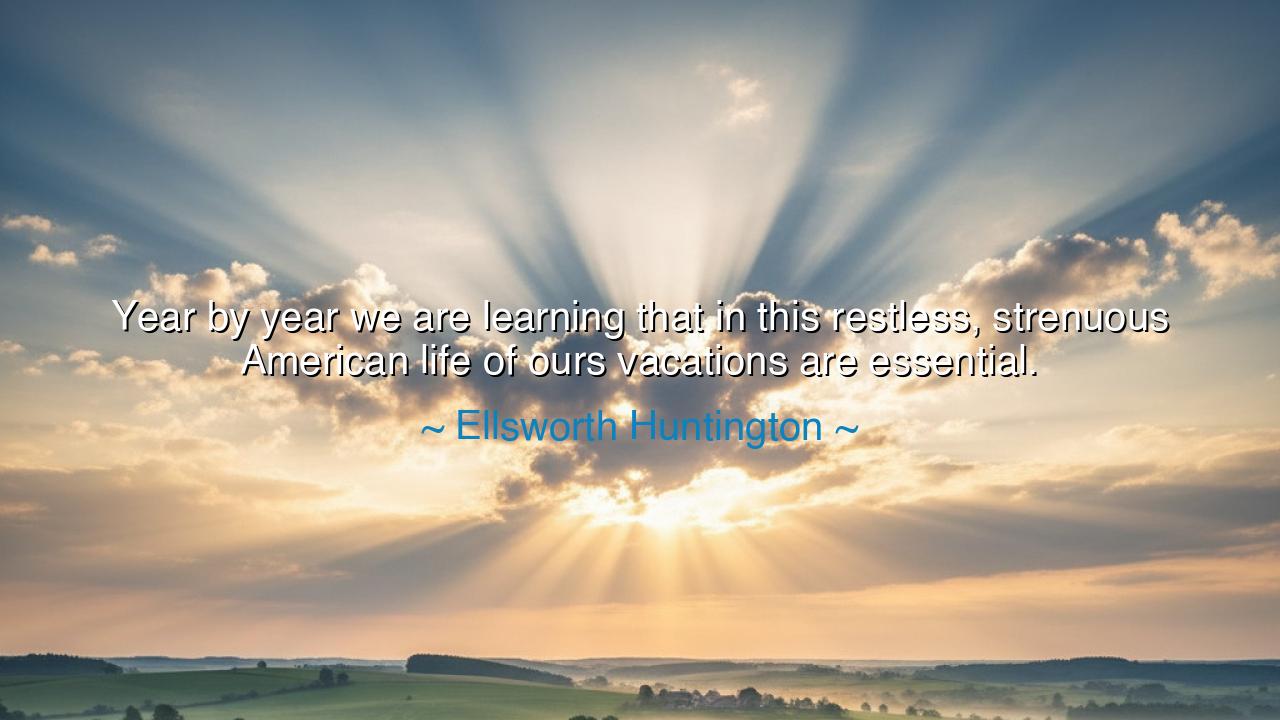
Year by year we are learning that in this restless, strenuous
Year by year we are learning that in this restless, strenuous American life of ours vacations are essential.






Hear the words of Ellsworth Huntington, a scholar of climates and civilizations, who perceived not only the shaping of nations by geography but also the weariness of the human soul. He declared: “Year by year we are learning that in this restless, strenuous American life of ours vacations are essential.” In this phrase lies wisdom often neglected, for he speaks not merely of leisure, but of the profound necessity of rest for the renewal of body, mind, and spirit.
The restless, strenuous American life he names is not confined to his age alone. It is the spirit of unceasing toil, of endless striving, of men and women who labor as though the world would collapse without their constant effort. Yet in such restlessness there is danger, for the bow kept always bent will one day snap. Huntington saw this truth: that vacations—periods of deliberate withdrawal from labor—are not luxuries but essential to survival, to creativity, and to the sustaining of a healthy people.
Consider the example of Theodore Roosevelt, who, though a man of immense vigor and energy, understood the need to retreat into the wilderness. It was in his hunting trips, his climbs, and his journeys into the forests and mountains that he found renewal. And it was from these times of rest and reconnection with nature that he drew strength to lead a nation and to establish the great system of national parks, ensuring that all people might have access to the healing power of rest. His life testifies to Huntington’s teaching: even the strongest must pause, or they will wither.
The ancients, too, honored this wisdom. The Greeks celebrated festivals where work ceased, and the people gathered for games, songs, and worship. The Hebrews enshrined in their law the Sabbath, a day of rest, commanded not only for the wealthy but for servants, strangers, and even animals. They understood that constant toil is slavery, and true freedom requires rest. Huntington’s words are but a modern echo of this ancient truth: that human beings are not machines, and without renewal, the spirit grows dull and the body weak.
Yet Huntington’s insight is also a warning. He speaks of learning year by year, for rest had been forgotten in the rush of progress. The industrial age prized production above all, and men and women labored in factories without pause. But over time, the cost became clear: broken health, weary minds, families left untended, and societies on the brink of collapse. Slowly, painfully, people remembered that rest is as vital as work. It was not indulgence, but necessity, for a nation cannot endure if its people are exhausted.
The lesson is radiant: do not despise the practice of rest. To step away from labor is not to betray your duty, but to strengthen yourself to fulfill it. Vacations are not mere pleasures, but sacred intervals where the soul breathes, where the mind regains clarity, and where the heart rediscovers joy. They are essential not only for individuals, but for communities and nations. A weary people cannot build a future; a renewed people can.
Practical action flows from this truth. Guard your time of rest as fiercely as your time of labor. Seek renewal in nature, in silence, in the company of loved ones. Do not allow the noise of ambition or the demands of others to rob you of the sacred pause. And encourage others to do the same, for in a society that honors rest, there is health, creativity, and endurance.
Thus, Ellsworth Huntington’s words must be carried forward: that in this restless and strenuous life, vacations are not indulgence but survival. Let every generation remember that the strength of a people is not measured only by their labor, but by their ability to step back, breathe, and return renewed. For in the rhythm of work and rest lies the secret of a flourishing life.






AAdministratorAdministrator
Welcome, honored guests. Please leave a comment, we will respond soon